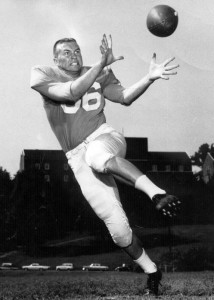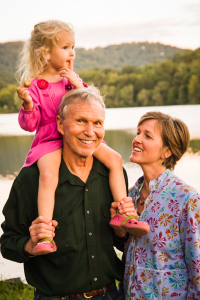I Don’t Mind Growing Old; I Just Don’t Want To Be There When It Happens.
“Don’t trust anyone over thirty,” I arrogantly proclaimed during the Sixties, when I was twenty-something and imagined I was bulletproof and would remain forever young.
I’m now more than four decades beyond that imaginary line of demarcation. When I look in the mirror it’s clear that I am aging—and I struggle to accept the reality reflected back to me. My hair is almost entirely gray and thinning. Facial wrinkles are becoming more pronounced, and I’ve got the dreaded turkey neck syndrome. My vision continues to decline, and my hearing is not what it once was. Plus, I’ve shrunk two full inches, now down to just under six feet tall. It’s equally clear I am not yet at peace with this terminal process, especially as my inner critic accuses me of heading down the slippery slope toward becoming feeble, incompetent, forgetful, and defenseless.

My days as a UT Vol football player
My image of myself is built on being healthy, strong, athletic, and able to take care of myself and those around me at all times. After all, I played football through my college years, and I’ve played handball since I was thirty or so. I took up running and volleyball a few years thereafter and began to do daily pushups and sit-ups around the time I reached forty (in part to avoid the Falstaffian paunch that afflicts so many men in later years). Since I hit the half-century mark, I have played in competitive handball tournaments and run marathons, as well as arduous trail races. I continue to play handball a couple of times a week, lift weights, and go on occasional trail runs.
So I certainly don’t plan to retire to the rocking chair any time soon. But I do acknowledge being half-a-step slower on the handball court. And my stamina for long runs is not what it once was. Plus, I now need an extra day of recovery time between particularly demanding workouts.
To paraphrase Woody Allen, “I’m not afraid of growing old; I just don’t want to be there when it happens.” But it does happen. To all of us. Unless we die beforehand. Can I say “yes” to this flow of life—birth to youth to middle age to elderly to death? Do I now accept my place as an elder in a culture that tends to stereotype, ignore, and denigrate the elderly, segregating and warehousing them in institutions for the aged and infirm?
Or am I the anomaly, the exception to the rule? Perhaps the inexorable passing of time will not affect me as it does some in their seventies and eighties. After all, I weigh the same as did in high school. And I recently underwent a battery of lab work and tests that showed I was healthy, with virtually no risk of stroke or heart attack. Perhaps I’ll keep going at this pace, and one day I’ll just be used up, spent, exhausted, my ashes laid to rest in my adopted home in the southern Appalachian Mountains. Perhaps these thoughts are merely the residual arrogance of my twenties.

Gracelyn, Shonnie & me
However, even in the midst of the BS my inner critic puts forth and the physical evidence that I’m aging, I have an inkling that some of my best years lie before me. I intend to continue working toward the creation of a more compassionate, just, and sustainable world and shifting my personal behavior toward being more loving, accepting, and prudent. Furthermore, I have essays and books to write, new places to explore, mysteries to unearth, mountain trails to run, friends and family to love, and a five-year-old daughter to shepherd into adulthood with my wife, Shonnie. So I trust I will find my way on this tricky terrain. All I need do is disregard my inner critic and remember: aging is inevitable; growing old is optional.
Oh, and the guy, Jack Weinberg, who coined the phrase “Don’t trust anyone over thirty.” A few years ago, he turned seventy, too.
[This essay appeared on The Good Men Project site, where I’m now a regular contributor.]
